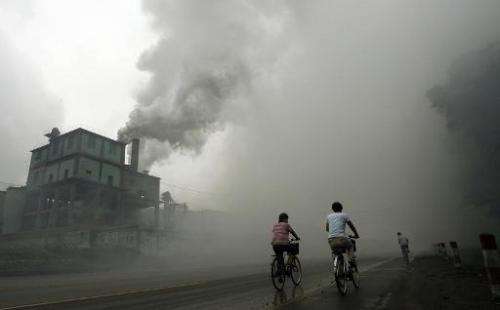Study urges 15-year plan for low-carbon growth

The world can save both financial and environmental costs by shifting toward a low-carbon economy over the next 15 years, a high-level panel said Tuesday ahead of a UN summit.
The commission co-chaired by former Mexican president Felipe Calderon called for greater global action on renewable power, deforestation and clean technologies as part of the fight against climate change.
The report said that the next 15 years would be critical, with the global economy undergoing major structural changes and time running out to meet a UN-backed goal of checking global warming at 2.0 degrees Celsius (3.6 Fahrenheit) above pre-industrial levels.
The study estimated that the world will see $90 trillion in new infrastructure investment over the next 15 years, a period that is expected to witness increasingly rapid urbanization.
"We can invest that amount of money in the current high-carbon emission path or we can do that in a different way," Calderon told reporters on a conference call.
"So the next 15 years of decisions and the next 15 years of investment will determine the future of the world, among other things, in the climate system," he said.
The report, a year in the making, played down the economic impact of a low-carbon focus. It estimated that greener investment would cost an additional $270 billion a year but said the expenses could be offset by lower costs elsewhere, such as reduced spending on fuel.

The view that climate action is too expensive "is based on a fundamental misunderstanding of the dynamics of today's global economy," the report said.
"It is anchored in an implicit assumption that economies are unchanging and efficient, and future growth will largely be a linear continuation of past trends."
The report said that health and deaths caused by air pollution were a major economic impediment, estimating that top carbon emitter China suffered costs equivalent to more than 10 percent of its gross domestic product.
Governments around the world have faced resistance curbs on carbon emissions, which are blamed for climate change, with opponents citing the economic impact including on jobs in polluting industries such as coal.
UN chief Ban Ki-moon has called the climate summit for September 23 in hopes of building momentum before a conference next year in Paris aimed at sealing a new global treaty on climate change.
The report—also written by British economist Nicholas Stern, the author of a major 2006 study on climate change—called for a phase-out of fossil fuel subsidies, which are politically sensitive in many countries.
The commission also recommended a goal of restoring at least 500 million hectares (two million square miles) of forest and agricultural land by 2030.
© 2014 AFP



















